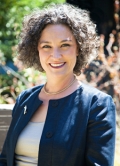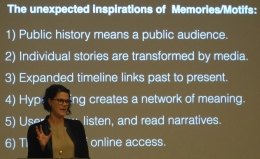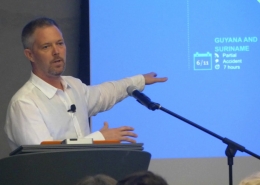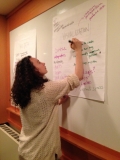- From the University Librarian
- The Digital Humanities at UC Santa Cruz
- The Role of Libraries in Data Management Services
- Welcome!
 Happy New Year from the University Library at UC Santa Cruz! I want to begin by thanking all of our generous donors and supporters for helping to make what we do possible and inspiring us to move forward.
Happy New Year from the University Library at UC Santa Cruz! I want to begin by thanking all of our generous donors and supporters for helping to make what we do possible and inspiring us to move forward.
I'd like to shine a spotlight in this issue on an exciting emerging area hinted at in recent newsletters: the University Library's role in digital scholarship. Our partnership with Ithaka S+R in surveying our faculty highlighted the need to help faculty manage their data. A majority of faculty reported collecting data, images, and media for their research but cited difficulty managing this scholarly output.
The University Library is working on several initiatives in this area that you will hear more about in the articles that follow. Our first ever Library-based postdoctoral fellow, Rachel Deblinger, who is focusing on developing a robust infrastructure to support work in the Digital Humanities and beyond, will describe her work since joining us in September of 2014 and her vision for the future. Rachel comes to us from UCLA where she recently completed her PhD in History and applied to a national Fellowship in Academic Libraries program administered by the Council of Library and Information Resources. You will also hear from Sue Chesley Perry, Head of Digital Initiatives, who is working with her department to ramp up services in collaboration with the California Digital Library to manage, preserve, and provide access to research data.
Our work to meet the demands in the area of digital scholarship has implications for services and spaces. We are taking this very seriously as we begin to reimagine some of the spaces in McHenry Library and in our work with the architectural firm EHDD to create an exciting vision for the Science & Engineering Library. I look forward to sharing these developments with you as they evolve.
Thank you again for your support!
Elizabeth Cowell
University Librarian
The Digital Humanities at UC Santa Cruz
Rachel Deblinger
Digital Humanities Specialist
Postdoctoral Fellow, Council on Library and Information Resources
Digital Humanities, as a field of study, applies digital tools and computational methods to the practice and study of Humanistic questions. More than a buzz word, the field is reimagining the role and impact of the university at the same time that it transforms the way students learn, faculty conduct research, and scholars communicate with each other and the broader public. As the new Digital Humanities Specialist and CLIR Postdoctoral Fellow at UC Santa Cruz, I have taken up the challenge of building a community around the practice and theory of Digital Humanities on campus and articulating the need for digital infrastructure that will support innovative and collaborative research and learning.
Humanistic questions. More than a buzz word, the field is reimagining the role and impact of the university at the same time that it transforms the way students learn, faculty conduct research, and scholars communicate with each other and the broader public. As the new Digital Humanities Specialist and CLIR Postdoctoral Fellow at UC Santa Cruz, I have taken up the challenge of building a community around the practice and theory of Digital Humanities on campus and articulating the need for digital infrastructure that will support innovative and collaborative research and learning.
For the 2014–15 academic year, the Digital Humanities Research Cluster, supported by the Institute for Humanities Research and the University Library, has launched a robust calendar of events, including a speaker series around the theme “Digital Humanities & Cultural Heritage,” a reading group focused on critical approaches to Digital Humanities, a series of Brown Bag Lunches designed to inspire graduate students to consider the possibilities of digital scholarship, and a series of informal Digital Happy Hours that enable faculty and graduate students to establish a shared vocabulary around digital engagement.
 These events bring together audiences from across the campus to showcase digital research projects and inspire new questions and approaches. For example, on November 12, Michael Ashley, CEO of the Center for Digital Archaeology and Director of Development at Murkurtu CMS, challenged an audience of campus and community members to imagine using internet-based technologies to preserve endangered cultural memory for generations to come. (A video of the event is available at: http://ihr.ucsc.edu/event/michael-ashley-mukurtu/). At a November 24 Brown Bag Lunch, Assistant Professor of History Elaine Sullivan, Associate Professor of Philosophy Jon Ellis, and Sociology graduate student Tracy Perkins discussed their digital projects, providing examples for graduate students from across the divisions illustrating the process of starting digital work, finding grant support, and engaging the public and scholarly and educational audiences in their research. On December 4, nearly 25 faculty members, librarians, graduate students, and technologists gathered to explore “Why the Digital Humanities?” by confronting and demystifying the buzziest concepts in Digital Humanities, including visualization, big data, metadata, and text analysis.
These events bring together audiences from across the campus to showcase digital research projects and inspire new questions and approaches. For example, on November 12, Michael Ashley, CEO of the Center for Digital Archaeology and Director of Development at Murkurtu CMS, challenged an audience of campus and community members to imagine using internet-based technologies to preserve endangered cultural memory for generations to come. (A video of the event is available at: http://ihr.ucsc.edu/event/michael-ashley-mukurtu/). At a November 24 Brown Bag Lunch, Assistant Professor of History Elaine Sullivan, Associate Professor of Philosophy Jon Ellis, and Sociology graduate student Tracy Perkins discussed their digital projects, providing examples for graduate students from across the divisions illustrating the process of starting digital work, finding grant support, and engaging the public and scholarly and educational audiences in their research. On December 4, nearly 25 faculty members, librarians, graduate students, and technologists gathered to explore “Why the Digital Humanities?” by confronting and demystifying the buzziest concepts in Digital Humanities, including visualization, big data, metadata, and text analysis.
The University Library plays an essential role in building this community and connecting the network of partners that enable digital engagement on campus. As a central hub of innovative digital work, the Library will ensure that UC Santa Cruz responds to the challenges of the digital age by creating opportunities for all community members to experiment with technology, develop digital literacies, build intellectual communities around the world, and explore new modes of knowledge making.
enable digital engagement on campus. As a central hub of innovative digital work, the Library will ensure that UC Santa Cruz responds to the challenges of the digital age by creating opportunities for all community members to experiment with technology, develop digital literacies, build intellectual communities around the world, and explore new modes of knowledge making.
In the year ahead, the dynamic community of digital humanists at UCSC will continue to grow and new projects will take shape. The Library will remain an essential leader in coordinating and amplifying the impact of doing digital scholarship and the possibilities of Digital Humanities.
The Role of Libraries in Data Management Services
Susan Chesley Perry
Head of Library Digital Initiatives
One important role of the UCSC Library is to collect, preserve, and disseminate the research and intellectual output of the university. Our buildings and web presence hold millions of books, recordings, and journal articles providing that service. The academic research world is experiencing two sea changes that are transforming that role in exciting ways. First, UC researchers are now producing, storing, and disseminating digital data—providing the foundation for those books and articles—in vast quantities. The sheer volume this data is challenging the capacity of institutions to manage it and researchers to make use of it. The second big change is that several federal agencies that fund academic research (including the NIH, NSF, and NEH) have begun requiring grantees of federally funded research to share the primary data gathered in the course of work with other researchers. The White House Office of Science and Technology Policy (OSTP) requires agencies to collect or create information in a way that supports downstream processing and use. All of this data, and the need to manage and share it, are big challenges for our researchers, but the Library is here to help. Here are a few of the services we provide with the help of the California Digital Library (CDL):
![]() The Data Management Planning Tool is a form-based website that walks researchers through the different funding agency requirements for managing and sharing data. It includes specific grant application requirements and sample plans for over 20 funders, including the National Science Foundation. The Library has customized the site with links to other campus units, templates, and guides for best practices.
The Data Management Planning Tool is a form-based website that walks researchers through the different funding agency requirements for managing and sharing data. It includes specific grant application requirements and sample plans for over 20 funders, including the National Science Foundation. The Library has customized the site with links to other campus units, templates, and guides for best practices.
![]() Merritt is a repository service that lets researchers manage, archive, and share valuable digital content. The Library works with the CDL to set up “bright” collections of data that can be shared, or “dark” collections for data that are not ready for sharing or may have privacy issues. The repository is replicated at the San Diego Supercomputer Center and at UCLA, and the CDL staff run a variety of checks on the content so there is no fear of data loss.
Merritt is a repository service that lets researchers manage, archive, and share valuable digital content. The Library works with the CDL to set up “bright” collections of data that can be shared, or “dark” collections for data that are not ready for sharing or may have privacy issues. The repository is replicated at the San Diego Supercomputer Center and at UCLA, and the CDL staff run a variety of checks on the content so there is no fear of data loss.
![]() This new service, about to be launched in early 2015, allows UCSC researchers to deposit and publish their datasets themselves. After deposit, the data will be indexed by search engines and downloadable by other researchers around the world.
This new service, about to be launched in early 2015, allows UCSC researchers to deposit and publish their datasets themselves. After deposit, the data will be indexed by search engines and downloadable by other researchers around the world.
![]() Researchers can get a DOI (digital object identifier) from the EZID service for any digital file or dataset they have on the web. This gives the file a persistent URL, so that if the web address of the data changes, any links or citations to that URL will redirect to the new site.
Researchers can get a DOI (digital object identifier) from the EZID service for any digital file or dataset they have on the web. This gives the file a persistent URL, so that if the web address of the data changes, any links or citations to that URL will redirect to the new site.
Consultation: Perhaps the most important service we provide to researchers is consultation. We can provide guidelines on how best to document, manage, and generally care for the data created by UCSC researchers. These consultations are most often conversations that help researchers define their needs, because not all researchers in all disciplines think of their digital research materials as “data.” We encourage faculty to think about digital files rather than spreadsheets and tables. Data can be digital images of letters taken with a camera at the National Archive. It can be genome sequences, online lab notebooks, the code and asset files of video games, digitized film clips, Excel spreadsheets, microscope images, and more. Librarians can provide guidance in managing each of these files, and meeting the challenge of the “data deluge.”
For more information about the Library’s data services, see our online guide at: http://guides.library.ucsc.edu/datamanagement
We are happy to welcome John Bono to the University Library at UC Santa Cruz as its Associate University Librarian, Planning and Resource Management. As a member of the Library senior management team and its principal budget, capital planning, and human resources officer, John will be a key contributor to the development and implementation of the Library’s strategic plan. John will also serve as the UCSC representative to the systemwide Administrative Services Advisory Group.
After joining UC in 1998, John served in leadership roles involving resource management, business operations, contracting, and employee relations at the Berkeley and Santa Cruz campuses before becoming the Director of UCSC Procurement Services in 2010. He holds a bachelor’s degree in Political Science from San Diego State University and a Juris Doctor from Quinnipiac University School of Law.
Contributors: Elizabeth Cowell, Rachel Deblinger, and Susan Chesley Perry
Production: Linda Hunt
Copyediting and proofreading: Mark Engel
Photography: Carolyn Lagattuta, Rachel Deblinger and Linda Hunt


 Santa Cruz, CA
Santa Cruz, CA



